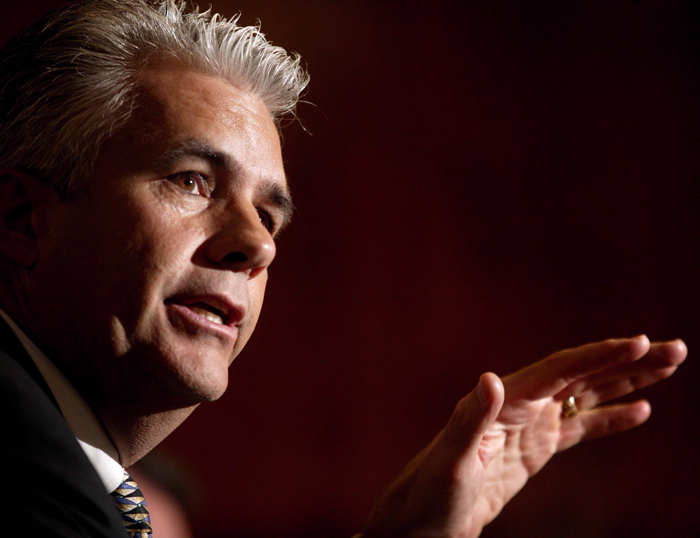Watchdogs are calling on the Senate Ethics Committee to continue digging into the hush money case against Sen. John Ensign (R-NV) despite his decision not to run for reelection.
The Ethics Committee last month announced the appointment a special prosecutor to lead the investigation into activities surrounding Ensign’s affair with a political staffer because the panel was finding it too difficult to pursue the case. But ethics committees don’t have jurisdiction over senators and members once they leave the House and Senate, and often the panels decide to drop their cases against lawmakers who announce their retirements and are heading out the door.
Not so fast, argue ethics watchdogs.
“Senator Ensign’s decision not to run for re-election does not absolve the Ethics Committee of its responsibility to hold him accountable,” said Citizens For Responsibility and Ethics in Washington’s Melanie Sloan. “The Ethics Committee should not use Sen. Ensign’s announcement as an excuse to sweep the whole matter under the rug. Senators need to know that actions have consequences. Unless and until Sen. Ensign resigns the investigation should proceed full-steam ahead.”
If the Senate Ethics Committee drops the case, it would be “an abdication of the committee’s responsibility,” declared Meredith McGehee, policy director of The Campaign Legal Center.
“I certainly wouldn’t put it past them, even with a special counsel, but it is indeed worth noting that Ensign is still in office, has months to serve and there are important points in this case on which the Ethics Committee should be heard so it is clear what the standards are,” she said.
Other watchdogs predicted that the Ensign case is far too advanced for the Ethics Committee to abandon it now. Once Ensign realizes the isn’t going away, he’ll like resign his seat, said Public Citizen’s Craig Holman.
“There is far too much ethical baggage associated with the Ensign case
for the Senate ethics committee to drop its probe as long as Ensign
remains a member of the Senate,” Holman said. “If the committee were to drop the case
while Ensign is in the Senate, it would come under a great deal of
criticism inside and outside of Congress for shirking its
responsibilities.”
“The case could only legitimately be dropped after Ensign resigns from the Senate, which
I would expect in fairly short order,” Holman continued. “Ensign has already conceded the
moral ground in announcing he will not run. When it becomes clear to him
that the ethics investigation will not cease until he leaves the senate,
he will resign.”
The Ensign case is particularly troubling because the investigation was well underway last year, and the evidence appeared to be mounting against Ensign. Ensign staffers had testified to the panel that Ensign and his senior aides knew they were breaking the one-year lobbying ban when they helped a former staffer set up a short-lived career on K Street, as The Hill reported last June.
The information was provided as part of the panel’s probe into payments Ensign’s parents made to Cynthia and Douglas Hampton. Ensign was having an affair with Cynthia, who is married to Douglas.
Both worked for Ensign, and Douglas Hampton was a close political aide. Ensign’s parents paid the Hamptons $96,000 once they left the senator’s employment. CREW filed a complaint with the ethics panel, charging Ensign with paying the Hamptons hush money.
Ensign admitted to the affair in June 2009 but has denied any wrongdoing. He cites the December decision by the Justice Department to abandon its criminal investigation and the Federal Election Commission’s decision to drop a probe into whether payments to the Hamptons violated campaign rules.
Watchdogs are not convinced. The Justice Department’s public integrity section, which is charged with investigating allegations against members of Congress, has been gutted, and the FEC has long been known as a paper tiger that very rarely takes aggressive action against members, they contend.









